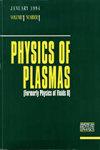Interaction between atmospheric pressure plasma jet and target
IF 2.2
3区 物理与天体物理
Q3 PHYSICS, FLUIDS & PLASMAS
引用次数: 0
Abstract
Interactions of floating potential on metal and dielectric targets with He atmospheric pressure plasma jet (APPJ) were studied in this paper. The APPJ is generated in a needle-ring corona-dielectric barrier discharge configuration, driven by a sinusoidal voltage. The characteristics of APPJ were assessed through electrical and optical examinations, and the time-average electrostatic voltage on the targets was measured using both contact and non-contact electrostatic voltmeters. It was found that both metal and dielectric targets can promote the jet development and speed up the jet velocity. During the negative half-cycle, the “plasma cluster” propagates from the target toward the ground electrode and then “merges” with the forward plasma jet, leading to a reversed development of jet. The two targets follow a similar pattern on the surface electrostatic voltage, that is, initially in a positive polarity whose amplitude first increases and then decreases and transits to negative polarity with an increase in the applied voltage. But there are also some minor differences between the two targets, e.g., the metallic target can change the discharge pattern and reduces the discharge current under certain conditions.大气压等离子体射流与目标之间的相互作用
本文研究了金属和介质目标上的浮动电势与氦大气压等离子体射流(APPJ)的相互作用。APPJ 是在正弦电压驱动下,在针环电晕-介质阻挡放电结构中产生的。通过电学和光学检查评估了 APPJ 的特性,并使用接触式和非接触式静电电压表测量了目标上的时间平均静电电压。研究发现,金属靶和电介质靶都能促进射流发展并加快射流速度。在负半周期间,"等离子簇 "从靶向接地电极传播,然后与正向等离子射流 "合并",导致射流反向发展。两个靶的表面静电电压模式相似,即最初为正极性,其振幅先增大后减小,并随着外加电压的增大转为负极性。但两种靶材之间也存在一些细微差别,例如金属靶材在某些条件下会改变放电模式并降低放电电流。
本文章由计算机程序翻译,如有差异,请以英文原文为准。
求助全文
约1分钟内获得全文
求助全文
来源期刊

Physics of Plasmas
物理-物理:流体与等离子体
CiteScore
4.10
自引率
22.70%
发文量
653
审稿时长
2.5 months
期刊介绍:
Physics of Plasmas (PoP), published by AIP Publishing in cooperation with the APS Division of Plasma Physics, is committed to the publication of original research in all areas of experimental and theoretical plasma physics. PoP publishes comprehensive and in-depth review manuscripts covering important areas of study and Special Topics highlighting new and cutting-edge developments in plasma physics. Every year a special issue publishes the invited and review papers from the most recent meeting of the APS Division of Plasma Physics. PoP covers a broad range of important research in this dynamic field, including:
-Basic plasma phenomena, waves, instabilities
-Nonlinear phenomena, turbulence, transport
-Magnetically confined plasmas, heating, confinement
-Inertially confined plasmas, high-energy density plasma science, warm dense matter
-Ionospheric, solar-system, and astrophysical plasmas
-Lasers, particle beams, accelerators, radiation generation
-Radiation emission, absorption, and transport
-Low-temperature plasmas, plasma applications, plasma sources, sheaths
-Dusty plasmas
 求助内容:
求助内容: 应助结果提醒方式:
应助结果提醒方式:


